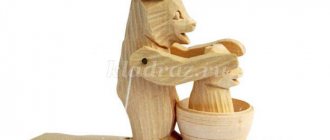Canaries
Let me introduce myself, dear children: I am a yellow canary. You are so cute that I wanted to tell you about my life.
I remember being very small, in a nest where my mother and father tenderly fed and warmed me. When I dressed up in a yellow dress and could jump out of the nest to the feeder myself, some old man with a gray beard transplanted me into another cage.
At first I was bored and very afraid of this old man, but when he began to clean my cage every morning and give me something to drink and eat, I got used to him and even fell in love with him. My old man lived in a small room, on the walls of which hung all the cages with canaries loudly singing their songs.
I didn’t yet know how to sing, but I loved listening to my comrades, and sometimes I myself tried to slowly imitate them.
When I quietly chirped, not daring to do it loudly, the old owner said to me affectionately:
- You will be a glorious singer, little yellow canary.
I became bolder and bolder and soon began to sing in a full voice, trying to shout out my comrades.
Various gentlemen often came into our room. They will look, listen, and sometimes take one of us with them. So once a lady took me. They transferred me to a new spacious cage and took me somewhere very far away.
Dear, I was scared of everything. But finally we got, as the lady said, “home.” A little girl greeted us in the room with the words: “Mom! Mother! Finally you’ve arrived, and with a bird too!”
- Here you are, Katyusha, little yellow canary. Take care of her and look after her. It must be kept neat, the sand in the cage must be changed daily, fresh water provided and canary seed given.
– Thank you, thank you very much, dear mother. Oh, what a lovely bird! I will love and take care of her very much.
The last words of my new mistress were extremely pleasant to me, and I immediately sang my best song to her.
- She sings so well! – the girl exclaimed. “And it’s all pure yellow.”
“Yes,” answered the mother. “This shows that she is a very good, purebred canary.”
I became even more proud hearing such praise. I lived with Katyusha for a long time and I had such a good time with her that I didn’t miss my comrades and my old owner at all.
But then the time came when the sun shone brighter and longer through my window and warmed me so pleasantly. They began to open the windows. I could clearly hear the singing of various birds in the yard and I myself tried to sing louder so that they could hear me.
“Kinochka, my dear,” my hostess says to me one day, “we are going to the village, and you will go to your aunt for a while.”
“Here you go! – I thought and was even offended. “They don’t take me, my beloved bird, with them…” and I chirped sadly.
– Don’t be bored and don’t forget me! – continued Katyusha. - Auntie loves you very much, you will feel good with her.
These words consoled me, and I began to expect a new change in my life.
When everyone left, I was taken to my aunt, who, it turned out, lived nearby. Indeed, I felt good here too. They always fed me on time, cleaned me up, and also gave me sugar and crackers, and here I also got a green salad, which I loved very much. After living for quite some time in the new place, I was again taken to my dear hostess, who was very happy when she saw me. She asked my aunt if I behaved well.
“Okay, okay,” said the aunt, “your canary amused me with its wonderful songs.” I really loved your bird. Next spring, again, while you are in the village, give it to me.
Of course, I was pleased to hear these words.
So I lived with Katyusha for some time; when they began to gather for the village again, they moved me back to my aunt.
Now I’ll tell you, children, what joy awaited me this time.
The very next day after my arrival, another bird was allowed into my cage. I got terribly angry about this and began to frantically chase and peck at the stranger. Then aunt transplanted her into another cage and placed us next to each other on the table.
I saw through the bars that the yellow bird with a gray head was also a canary.
She seemed to really want to get to me again, but seeing that this couldn’t be done, she chirped a little and calmly began jumping around in her cage. I wanted to show her my art, and I, raising my head up, sang loudly. The bird listened. She liked my singing. But what did I see next? The canary calmly set about doing some work! I expected to hear her singing and compare it with mine, but instead she was diligently tugging at some string with her beak, holding it with her legs; sometimes she moistened her with water in a cup and continued to work diligently to the sounds of my songs, which I poured out in order to show her my art.
I was very interested: why is she doing this and not singing with me?
She worked so diligently and with such love that I myself wanted to get into her cage and do her work.
I began to jump along the cage, looking for a way out of it, while the canary chirped and called me to her. I was annoyed that my aunt seated us.
The next morning, Aunt came, opened the doors of both cages and placed them one against the other.
I immediately jumped up to my new friend and, as a sign of apology for my impolite reception yesterday, sang to her my best song.
Then we began to fray the strings and rags that Auntie had laid out for us.
I saw that my friend was carrying everything she was disheveled into a basket tied to a cage. Then I began to do the same.
This work occupied us for several days; I didn’t even want to sing. And so, through our common efforts, we built a wonderful, soft nest. As soon as it was ready, my friend sat in it and smugly squeaked her short song to me as a sign of gratitude. I immediately began to sing a long song to her, with all kinds of overtones.
The next day, in the morning, the canary laid a greenish egg into this nest.
A few days later there were already three eggs in the nest, but we carelessly broke one of them, while the other two began to be carefully warmed and incubated.
True, I sat in the nest only when my beauty went to eat and drink. Sitting in the nest, I waited impatiently for her return, because I was terribly afraid of crushing those tender testicles. She always tweeted to me: “Sit, sit, so as not to cool down. I need to straighten my legs.”
Many days passed like this, and then one day my beauty looked at me especially joyfully when I brought her a soaked bun in my beak. She squeaked to me: “Look what we have,” and quickly jumped up onto her belt, but immediately sank down again. And at that moment I saw something small move under her. Oh joy! The chick has hatched! To celebrate, I began to sing, but quietly, in an undertone, for fear of scaring the little one.
Two days later, a chick hatched from another egg. We were happy. The mother did not leave the nest for a minute, and I diligently brought her food and constantly thought: if only she would sit in the nest and not send me to warm the chicks - I was so afraid of crushing them. They were very small, without feathers, only fluff sticking out here and there; instead of eyes, some black spots were visible. About five days later the chicks were covered in down, and the mother jumped out to recover and peck. With fear and trembling, I went to protect the children, but did not dare to go into the nest to warm them: I remained on the edge, with outstretched wings. It was very awkward for me to stand like that. I was looking forward to my mother's return. She kept looking back at me and chirping loudly so that I wouldn’t dare leave until she returned. However, I could not resist and approached her; then my friend got angry, and I, embarrassed, took off again to my children.
To tell the truth, my mother did not finish her dinner for very long, but it seemed to me like an eternity.
Soon I got used to my new occupation and even enjoyed going to warm my chicks. Then the canary began to jump out of the nest more often and gave up her place to me with pleasure, seeing that I was fulfilling her instructions quite well.
“Take care of them, take care of them, there, without me,” she often chirped to me. Soon we began to feed them from our beaks. Auntie now gave us a separate cup with eggs and a bun, which we gave to our dear dear children. Thanks to our constant care and good care, the chicks grew rapidly and began to become covered with feathers. One day, aunt transplanted us all into a large new cage, with a shelf in which two nests were built. She put our little ones in one, and in the other we planned to take out the children as soon as they were able to feed themselves. After a few days, our babies became so strong and fledged that they began to jump out of the nest onto the shelf, and then onto the perch and onto the sand. We started chatting merrily with them. They all sat together on the perch, and I quietly sang my songs to them. We were extremely pleased. Seeing that the young couple no longer needed us, and they themselves were flying to the cups for food and drink, we set to work on a new nest. My friend hurried to put four eggs there, and again we began to carefully warm them. But the young people constantly squeezed into the nest, wanting to warm up and bask under their mother’s wing. Of course, they often pushed and disturbed the testicles while climbing into the nest, which my aunt noticed and transplanted them into another cage. We were sorry to part with them, but we understood why she did it. Unfortunately, it was too late and nothing came of our four testicles. I decided to build a nest again, but the canary squealed that it was enough: “I’m tired of sitting; because it’s much more difficult for me than yours.” I didn’t like this objection, I got angry and started pecking at her. Just at this time my aunt came in. She saw my beatings, immediately opened the cage, took my friend away from me and put her in another house.
“Now you sit alone,” said the aunt. “Sing and teach the children to sing, but you don’t dare fight.” I was punished. Soon afterwards I was moved to Katyusha. In my songs, I tried to tell her everything that happened at my aunt’s summer - all my great joy and my grief. She understood me: she went to see my friend and children and brought me good news and greetings from her family.
I imagine how wonderfully my chicks sing now. They were so obedient, attentive and diligent, and with these qualities, children always achieve great success.
Source
(Translation from Bulgarian)
“Master, why should I sit in a cage on a perch, and not in the garden on a branch? Why are you keeping me locked up? For ringing trills, for cheerful songs, the lattice shelter of your songbird is cramped!” “Just try to let you go - only feathers and legs will remain!” I’m protecting you from the bloodthirsty cat!” “Isn’t it better then, preserving my life this way, to lock up that cat in order to let me out?!”
Invite your child to come up with a riddle about a canary. You start, and the baby finishes.
“She’s yellow like... She sings like... She flies like... Who is that?”
There may be another version of the wording of the same riddle:
“Yellow, not... Sings, not... Flies, not... Who is this?”
Write down the child's riddle and tell it to friends and relatives. This will give the child the opportunity to feel the significance of his first steps in speech creativity and his first success.
Finches
Finches can also sometimes be kept at home. These small birds have bright, catchy plumage, which is why they have gained such great popularity among breeders.
It is not very easy to distinguish between a male and a female, so when purchasing a bird, pay special attention to this point. Female finches do not sing, but the males produce such beautiful melodies that the lack of a female may not even be noticed if you buy two birds.
Blackbirds
Some species of blackbirds, finches, goldfinches, pigeons, siskins and jays are also ornamental birds that can be kept outside the wild, no matter how paradoxical this may sound, considering that these bird representatives can be seen on the street every day.
It is quite problematic to keep blackbirds at home: they require constant care. Among their advantages is their unique singing. They can only be kept in a large space in sunlight; the enclosure (cage) must have a place for swimming. Many breeders, despite the huge number of difficulties that arise during the care process, still keep these ornamental birds in their homes.
Finches
Finches live in the wild in the tropics. They have a specific bright color. This attracts the attention of a huge number of bird breeders. The birds look quite impressive and exotic. The birds are also quite active and funny. They are easily tamed and, with proper care, can become good friends for anyone. It can also be noted that finches do not sing very beautifully - and this is their biggest disadvantage. Their singing sounds like some kind of whistling or even hissing. But finches easily compensate for this deficiency with their friendliness and trust in humans. Otherwise, these birds have only positive qualities. There is a Japanese species of finches. These birds are a more domesticated "version".
One of the main advantages of Japanese finches is their cleanliness: they litter little and the cage cannot be cleaned very often.
jays
Jays, in addition to their bright plumage, also have one very incredible quality: they can imitate any sounds they have ever heard.
Birds are not very demanding in terms of nutrition and care; they can eat regular feed mixtures. It is recommended to buy a small chick rather than an adult bird because it will be much easier to tame.
Goldfinches
Goldfinches are quite bright birds with beautiful elegant plumage. Their voice is very melodic.
Goldfinches are very active birds. They are well tamed, but not all of them: there are quite aggressive individuals, but this is rare; in general, most birds are friendly.
These birds cannot be kept in the same cage with other species. Males sing better than females.



